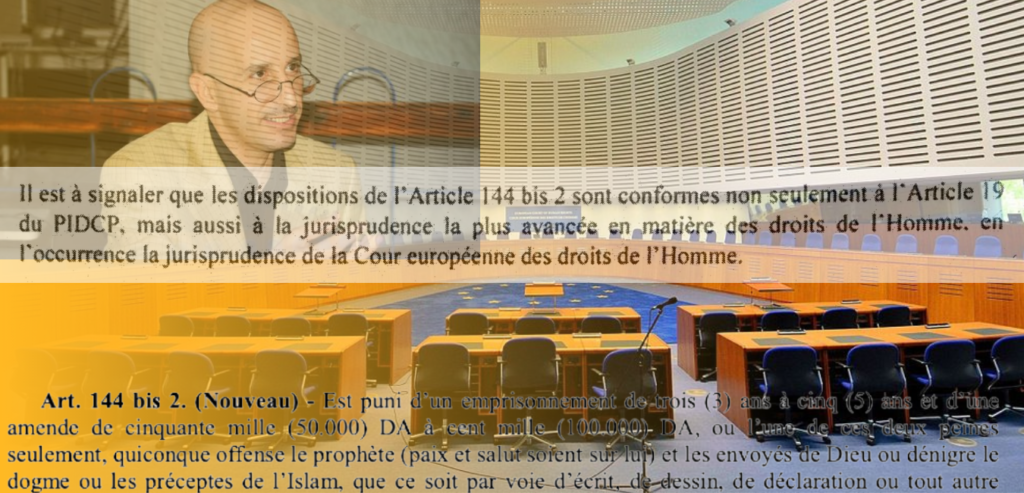Statement by the Forum for Religious Freedom-Europe, Set My People Free, and Jubilee Campaign
8 November 2021 – Vienna and Stockholm, Gorinchem | A 2018 decision by the European Court of Human Rights (ECHR) upholding the conviction of an Austrian citizen by a Vienna court for “disparaging religious doctrines” has been used by the Government of Algeria to defend the sentencing a scholar to three years in prison for “denigrating the dogma and the precepts of Islam.”
“The case illustrates how European jurisprudence criminalizing speech can harm the defense of human rights and freedoms in countries that look to Europe for positive examples,” according to Dr. Aaron Rhodes, President of the Forum for Religious Freedom-Europe (FOREF).
In April 2021, the Sidi Mhamed Court of First Instance in Algeria sentenced Saïd Djabelkhir, an expert on Sufi Islam, under Article 144 of the Algerian Penal Code, for the “crime” of arguing that the sacrifice of sheep pre-dated Islam, and that Islamic scriptures do not mandate the marriage of pre-pubescent girls and the use of head coverings. Djabelkhir said these were “academic reflections.”
Local and international human rights groups have denounced the conviction, with a representative of Amnesty International stating, “It is outrageous that Saïd Djabelkhir is facing three years in prison simply for voicing his opinions about religious texts.”
The case drew the attention of United Nations Special Rapporteurs on freedom of religion and belief and freedom of opinion and expression. In a communication addressed to the Government of Algeria the Special Rapporteurs outlined the facts of the case and raised concerns regarding death threats made toward Professor Djabelkhir, which increased after Algerian authorities filed charges against the professor in January 2020. The Special Rapporteurs also emphasized that international human rights law regarding freedom of religion or belief does not protect religions from criticism or “any comments perceived as unfavorable.” The Special Rapporteurs also pointed out that where a religion is recognised as the state religion it should in “no way” affect the enjoyment of rights protected under the International Covenant on Civil and Political Rights (ICCPR).
The Special Rapporteurs then asked specifically how the Government of Algeria justified its anti-blasphemy laws, such as article 144 bis 2 “offense against the Prophet” [and “denigration of dogma or the precepts of Islam”] with regard to its international law obligations.
The Algerian government’s response of 22 September 2021 made reference to the case of Elisabeth Sabaditsch-Wolff, who was convicted in 2011 for “disparaging religious doctrines,” when a local court ruled that her questioning if the Prophet Mohammed’s possible “pedophilia” was not protected as freedom of expression under the European Convention on Human Rights. The ruling was upheld by a 2018 decision of the European Court of Human Rights, which held that the domestic courts “carefully balanced the applicant’s right to freedom of expression with the rights of others to have their religious feelings protected, and to have religious peace preserved in Austrian society.” Freedom of speech, the ruling stated, needs to be conditioned on expressions being made in an “objective manner contributing to a debate of public interest.”
In defending Djabelkhir’s jail sentence, Algerian authorities paraphrase the ECHR judgement, saying that freedom of expression needs to be weighed against rights of other people to protect their religion and keep the peace, and that the law under which he was charged is “consistent not only with Article 19 of the ICCPR, but also with the most advanced jurisprudence in the field of human rights, in this case to the jurisprudence of the European Court of Human Rights.” (emphasis added)
As FOREF noted in a statement about the decision, this “advanced jurisprudence” endorsed what is in effect a blasphemy law. The vague language in the ruling is at variance with a central principle of human rights and the rule of law, namely that legal rulings need to be clear and unambiguous to avoid political misuse. Set My People Free also released a statement noting that the ECHR had “shot itself in the foot,” and that the judgement would make the situation more difficult for religious minorities and those already being persecuted under blasphemy laws, “providing fuel for perpetrators of violence rather than defending an open democratic discussion.”
Regrettably, it appears that the European Court of Human Rights now provides a model, not for the protection of fundamental, inherent rights, but for how they can be infringed upon by regimes seeking to shut down factual debates at the behest of religious authorities.
For more information:
Dr. Aaron Rhodes, FOREF, +49-170-323-8314; aaronarhodes@gmail.com
Hulda Fahmi, Set My People Free, +46-730-307-460; hulda.fahmi@smpf.net
Peter Bronsveld, Jubilee Campaign, The Netherlands, +44-787-499-6422
Originally published here: https://foref-europe.org/blog/2021/11/08/echr-model-for-algerias-repression-of-free-speech/

